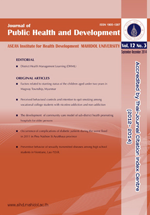Factors associated with resilient Thai students of international programs
Main Article Content
Abstract
This cross-sectional study was conducted to identify the percentage of students who had high level of resilience and examine factors associated with resilience among Thai students in international programs in Bangkok and suburb, Thailand. Data collection were conducted among Thai students aged 18 to 24 in three international programs in May 2017. A self-administered questionnaire employed was composed of demographic factors, Connor-Davidson Resilience Scale (CD-RISC) and Adverse childhood experiences (ACEs) questionnaire. A total of 379 questionnaires were used in data collection and for analysis. Chi-square tests were performed to identify the association between independence variables and resilience and multiple logistic regression was used to determine predictors of resilience.
The result showed over half (53%) of respondents were in high level of resilience. The result of Chi-square tests showed that age and peer support were the factors significantly associated with resilience level (p-value<0.01). In logistic regression, age (Adj. OR= 2.53, 95%CI=1.52-4.20) sex (Adj. OR=1.67, 95%CI=1.07-2.61) and peer support (Adj. OR=2.70, 95%CI=1.66-4.41) were significant factors. In conclusion, an individual who has low resilience could be difficult to deal with adversity or difficulties regardless of ACEs level, and it would be more essential to explore the protective factors that lead to positive adaptation in different contexts.
The result also implied that resilience could have been nurtured as the times go by with close peer company in their lives. Especially among youths in the study, male had higher resilience than female. However, there are still unknown complex factors behind resilience and need to continue further
investigation for complex factors under the process of their lives.


